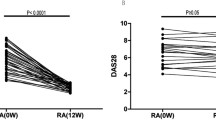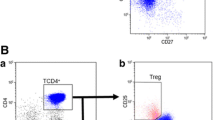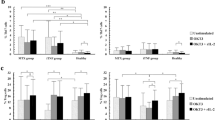Abstract
Purpose
The immunogenicity of anti-TNF-α drugs may affect their safety and efficacy. Infliximab (IFX), a chimeric monoclonal antibody, induces antibody formation in up to 60 % of cases. Some studies have suggested the involvement of a Th1 response to TNFα blockers following immunization, but the triggering of Th17 responses has never been reported. The aim of this study is to investigate whether the immunogenicity of IFX affects the Th1, Th17 and Treg compartments in rheumatoid arthritis (RA) patients failing IFX therapy, and verify whether this may be responsible for treatment failure.
Methods
The study involved 55 patients with RA (15 treatment-naïve patients; 20 IFX responders; 20 IFX non-responders) and 10 healthy controls. PBMCs were cultured in the presence/absence of IFX, and the variations in the percentage of Th1, Th17 and Treg lymphocytes following IFX treatment were analysed.
Results
IFX-specific Th1 and Th17 responses and an increase in IL-21 production were observed in patients failing IFX (p < 0.01, p < 0.05, and p < 0.01 respectively). In contrast, IFX incubation reduced significantly Th1 and Th17 responses and IL-21 production (p < 0.05) in successfully-treated subjects, but did not affect these responses in healthy controls or treatment-naïve patients.
Conclusions
RA patients may have impaired peripheral tolerance, which could favour the development of an aberrant immunological response to biological drugs. The loss of therapeutic effectiveness of IFX and the onset of adverse events may be due to a paradoxical activation of Th17 or Th1 lymphocytes following sensitisation, thus worsening the patients’ inflammatory status.




Similar content being viewed by others
References
Purcell RT, Lockey RF. Immunologic responses to therapeutic biologic agents. J Investig Allergol Clin Immunol. 2008;18:335–42.
Harding FA, Stickler MM, Razo J, DuBridge RB. The immunogenicity of humanized and fully human antibodies: residual immunogenicity resides in the CDR regions. MAbs. 2010;2:256–65.
Fiorino G, Danese S, Pariente B, Allez M. Paradoxical immune-mediated inflammation in inflammatory bowel disease patients receiving anti-TNF-alpha agents. Autoimmun Rev. 2014;13:15–9.
Krieckaert CL, Bartelds GM, Wolbink GJ. Therapy: immunogenicity of biologic therapies: we need tolerance. Nat Rev Rheumatol. 2010;6:558–9.
Radstake TR, Svenson M, Eijsbouts AM, van den Hoogen FH, Enevold C, van Riel PL, et al. Formation of antibodies against infliximab and adalimumab strongly correlates with functional drug levels and clinical responses in rheumatoid arthritis. Ann Rheum Dis. 2009;68:1739–45.
Vultaggio A, Matucci A, Nencini F, Pratesi S, Parronchi P, Rossi O, et al. Anti-infliximab IgE and non-IgE antibodies and induction of infusion related severe anaphylactic reactions. Allergy. 2010;65:657–61.
Pascual-Salcedo D, Plasencia C, RamiroS, Nuño L, Bonilla G, Nagore D, Ruiz Del Agua A, Martínez A, Aarden L, Martín-Mola E, Balsa A. Influence of immunogenicity on the efficacy of long-term treatment with infliximab in rheumatoid arthritis. Rheumatology (Oxford). 2011;1445–52.
Atzeni F, Talotta R, Salaffi F, Cassinotti A, Varisco V, Battellino M, et al. Immunogenicity and autoimmunity during anti-TNF therapy. Autoimmun Rev. 2013;12:703–8.
Torres MJ, Chaves P, Doña I, Blanca-López N, Canto G, Mayorga C, et al. T-cell involvement in delayed-type hypersensitivity reactions to infliximab. J Allergy Clin Immunol. 2011;128:1365–7.
Aletaha D, Neogi T, Silman AJ. Rheumatoid arthritis classification criteria. an American College of Rheumatology/European League Against Rheumatism Collaborative Initiative. Arthritis Rheum. 2010;6:2569–81.
Krieckaert CL, Nurmohamed MT, Wolbink GJ. Methotrexate reduces immunogenicity in adalimumab treated rheumatoid arthritis patients in a dose dependent manner. Ann Rheum Dis. 2012;71:1914–5.
García-Piñeres A, Hildesheim A, Dodd L, Kemp TJ, Williams M, Harro C, et al. Cytokine and chemokine profiles following vaccination with human papillomavirus type 16L1 virus-like particles. Clin Vaccine Immunol. 2007;14:984–9.
Purvis S, Asaad R, Valerio I, Sha BE, Landay AL, Lederman MM. Levels of proinflammatory cytokines in plasma after pneumoccoccal immunization in human immunodeficiency virus type 1-infected patients. Clin Diagn Lab Immunol. 1999;6:427–8.
Weigmann B, Jarman ER, Sudowe S, Bros M, Knop J, Reske-Kunz AB. Induction of regulatory T cells by leflunomide in a murine model of contact allergen sensitivity. J Investig Dermatol. 2006;126:1524–33.
Chong AS, Ma LL, Shen J, Blinder L, Yin DP, Williams JW. Modification of humoral responses by the combination of leflunomide and cyclosporine in Lewis rats transplanted with hamster hearts. Transplantation. 1997;64:1650–7.
Belmar NA, Lombardo JR, Chao DT, Li O, Ma X, Pong-Afar M, et al. Dissociation of the efficacy and cytokine release mediated by an Fc-modified anti-CD3 mAb in a chronic experimental autoimmune encephalomyelitis model. J Neuroimmunol. 2009;212:65–73.
St Clair EW, Wagner CL, Fasanmade AA, Wang B, Schaible T, Kavanaugh A, et al. The relationship of serum infliximab concentrations to clinical improvement in rheumatoid arthritis: results from ATTRACT, a multicenter, randomized, double-blind, placebo-controlled trial. Arthritis Rheum. 2002;46:1451–9.
Weber CA, Mehta PJ, Ardito M, Moise L, Martin B, De Groot AS. T cell epitope: friend or foe? Immunogenicity of biologics in context. Adv Drug Deliv Rev. 2009;61:965–76.
Azfali B, Lombardi G, Lechler I, Lord GM. The role of T helper 17 (Th17) and regulatory T cells (Treg) in human organ transplantation and autoimmune disease. Clin Exp Immunol. 2007;148:32–46.
Svenson M, Geborek P, Saxne T, Bendtzen K. Monitoring patients treated with anti-TNF-alpha biopharmaceuticals: assessing serum infliximab and anti-infliximab antibodies. Rheumatology. 2007;46:1828–34.
Noman M, Vermeire S, Van Assche G, D’ Haens G, Carbonez A, Rutgeerts P. Influence of immunogenicity on the long-term efficacy of infliximab in Crohn’s disease. N Engl J Med. 2003;348:601–8.
Van de Putte LBA, Atkins C, Malaise M, Sany J, Russell AS, van Riel PL, et al. Efficacy and safety of adalimumab as monotherapy in patients with rheumatoid arthritits for whom previous disease modifying antirheumatic drug treatment has failed. Ann Rheum Dis. 2004;63:508–16.
Krieckaert CL, Bartelds GM, Lems WF, Wolbink GJ. The effect of immunomodulators on the immunogenicity of TNF-blocking therapeutic monoclonal antibodies: a review. Arthritis Res Ther. 2010;12:217.
Lina C, Conghua W, Nan L, ** Z. Combined treatment of etanercept and MTX reverses Th1/Th2, Th17/Treg imbalance in patients with rheumatoid arthritis. J Clin Immunol. 2011;31:596–605.
James E, Rieck M, Pieper J, Gebe JA, Yue BB, Tatum M, et al. Citrulline specific Th1 cells are increased in rheumatoid arthritis and their frequency is influenced by disease duration and therapy. Arthritis Rheum. 2014;66:1712–22.
Leipe J, Grunke M, Dechant C, Reindl C, Kerzendorf U, Schulze-Koops H, et al. Role of Th17 cells in human autoimmune arthritis. Arthritis Rheum. 2010;62:2876–85.
van Hamburg JP, Mus AM, Colin EM, Hazes JM, Dolhain RJ, Lubberts E. Th17 cells, but not Th1 cells, from patients with early rheumatoid arthritis are potent inducers of matrix metalloproteinases and proinflammatory cytokines upon synovial fibroblast interaction, including autocrine interleukin-17A production. Arthritis Rheum. 2011;63:73–83.
Eriksson C, Rantapää-Dahlqvist S, Sundqvist KG. Changes in chemokines and their receptors in blood during treatment with the TNF inhibitor infliximab in patients with rheumatoid arthritis. Scand J Rheumatol. 2013;42:260–5.
Kawashima M, Miossec P. Effect of treatment of rheumatoid arthritis with infliximab on IFNγ, IL4, T-bet, and GATA-3 expression: link with improvement of systemic inflammation and disease activity. Ann Rheum Dis. 2005;64:415–8.
Aravena O, Pesce B, Soto L, Orrego N, Sabugo F, Wurmann P, et al. Anti-TNF therapy in patients with rheumatoid arthritis decreases Th1 and Th17 cell populations and expands IFN-γ-producing NK cell and regulatory T cell subsets. Immunobiology. 2011;216:1256–63.
Li W, ** Y, **e C, Jiang T, Zhang J, Dong C, et al. Regulatory immune responses induced by IL-1 receptor antagonist in rheumatoid arthritis. Mol Immunol. 2011;49:290–6.
Kanayama K, Nakamura K, Ogino H, Sumida Y, Ihara E, Akiho H, et al. Th1 response are more susceptible to infliximab-mediated immunosuppression than Th17 response. Dig Dis Sci. 2011;56:3525–33.
Ehrenstein MR, Evans JG, Singh A, Moore S, Warnes G, Isenberg DA, et al. Compromised function of regulatory T cells in rheumatoid arthritis and reversal by anti-TNFalpha therapy. J Exp Med. 2004;200:277–85.
Lawson CA, Brown AK, Bejarano V, Brown AK, Bejarano V, Douglas SH, et al. Early rheumatoid arthritis is associated with a deficit in the CD4+CD25high regulatory T cell population in peripheral blood. Rheumatology (Oxford). 2006;45:1210–7.
Nadkarni S, Mauri C, Ehrenstein MR. Anti-TNF-alpha therapy induces a distinct regulatory T cell population in patients with rheumatoid arthritis via TGF-beta. J Exp Med. 2007;204:33–9.
Nie H, Li R, Guo TB, He D, Fang L, Liu X, et al. Phosphorylation of FOXP3 controls regulatory T cell function and is inhibited by TNF-α in rheumatoid arthritis. Nat Med. 2013;19:322–8.
Nistala K, Adams S, Cambrook H, Ursu S, Olivito B, de Jager W, et al. Th17 plasticity in human autoimmune arthritis is driven by the inflammatory environment. Proc Natl Acad Sci U S A. 2010;107(33):14751–6.
Joller N, Kuchroo VK. Good guys gone bad: exTreg cells promote autoimmune arthritis. Nat Med. 2014;20:15–7.
Acknowledgments
We would like to thank Dr. Donata Dell’Acqua for her technical support and all residents and consultants for their kind collaboration.
This study was supported by FIRA (Italian Foundation focused on Rheumatoid Arthritis Research), which did not play any role in conducting the study, deciding on the analyses, or writing the manuscript. The authors declare no competing interest
Author information
Authors and Affiliations
Corresponding author
Additional information
Rossella Talotta and Angela Berzi contributed equally to this work.
Rights and permissions
About this article
Cite this article
Talotta, R., Berzi, A., Atzeni, F. et al. Paradoxical Expansion of Th1 and Th17 Lymphocytes in Rheumatoid Arthritis Following Infliximab Treatment: a Possible Explanation for a Lack of Clinical Response. J Clin Immunol 35, 550–557 (2015). https://doi.org/10.1007/s10875-015-0182-0
Received:
Accepted:
Published:
Issue Date:
DOI: https://doi.org/10.1007/s10875-015-0182-0




